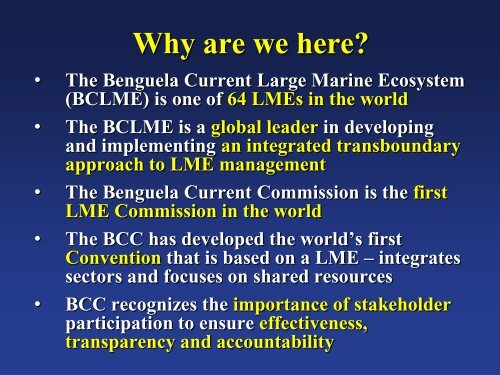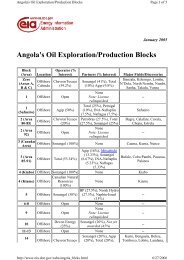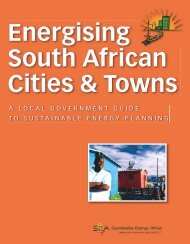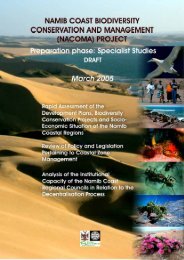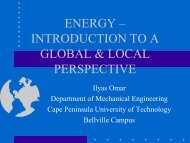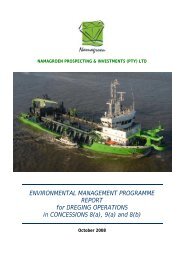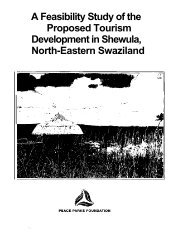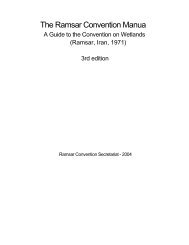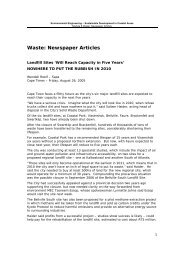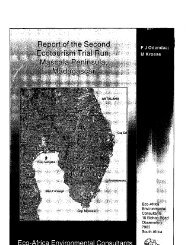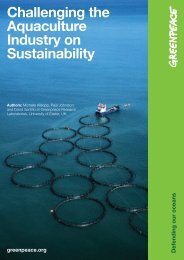Overview of the BCC and implementation of the ... - DLIST Benguela
Overview of the BCC and implementation of the ... - DLIST Benguela
Overview of the BCC and implementation of the ... - DLIST Benguela
Create successful ePaper yourself
Turn your PDF publications into a flip-book with our unique Google optimized e-Paper software.
Stakeholder Involvement & Info Sharing• Radio/TV Talks• Print media• Web-based platforms• Email list servers• Guest talks/lectures• Film festivals• Workshops/meetings• Special events• National Inter-sectoral Stakeholder Groups (NISG)Recommend o<strong>the</strong>r ways to inform <strong>and</strong> involve stakeholders
BENEFITBCLMESAP Implementation1998Transboundary Diagnostic Analysis –identify key threats <strong>and</strong> <strong>the</strong>ir root causes2002Development <strong>of</strong> Strategic Action Programme (SAP)Interim Agreement to establish <strong>BCC</strong>Shared fish stocks identified as key living transboundaryresource <strong>of</strong> Global Biodiversity Importance - GEF2007/ 2008- Development <strong>of</strong> <strong>the</strong> Strategic Action Programme (SAP)Implementation Project- Closure <strong>of</strong> BCLME Programme - Recommendations2013- Establish <strong>BCC</strong> – NOT FISHERIES ONLY- Develop Convention- Strategic Environmental Assessment- Valuation <strong>of</strong> Goods <strong>and</strong> Services- Demonstration sites- Harmonisation <strong>of</strong> policies <strong>and</strong> lawsStakeholderParticipation<strong>BCC</strong> focuses on mainstreaming <strong>and</strong> integrating o<strong>the</strong>r sectors [non-fisheries] to ensureall issues are identified/addressed <strong>and</strong> stakeholders involved
How far have we come –Background to <strong>the</strong> <strong>Benguela</strong>Current Commission (<strong>BCC</strong>)Nico E. WillemseSr. Project ManagerBCLME SAP IMP Project
BCLME Programme GoalIntegrated management,sustainable development <strong>and</strong>protection <strong>of</strong> <strong>the</strong> <strong>Benguela</strong> CurrentLarge Marine Ecosystem
<strong>Benguela</strong> Current LME Programme• Countries: Angola, Namibia<strong>and</strong> South Africa• Duration: 2002 - 2008• Implementing agency: UNDP• Executing agency: UNOPS• GEF: US$ 15,000,000.00• In-kind: US$ 18,000,000.00
BCLME ProgrammeFocus Areas• Productivity <strong>and</strong> Fisheries• Environmental Variability <strong>and</strong> Predictability• Seabed Mining (e.g. diamonds)• Oil <strong>and</strong> Gas Exploration <strong>and</strong> Production• Ecosystem Health <strong>and</strong> Pollution• Socio-economics <strong>and</strong> Governance• Training <strong>and</strong> Capacity Building
Strategic Action Programme(SAP)The SAP was developed based on <strong>the</strong> outcome <strong>of</strong> aTransboundary Diagnostic Analysis (TDA) carried outby Angola, Namibia <strong>and</strong> South AfricaTDA identified <strong>and</strong> investigated <strong>the</strong> causes <strong>of</strong> negativeimpacts on <strong>the</strong> BCLMEAfter this, <strong>the</strong> three countries agreed on specific actionsthat need to be carried out to improve planning, use<strong>and</strong> management <strong>of</strong> resources in <strong>the</strong> BCLMEThese actions were included in <strong>the</strong> SAP <strong>and</strong> signed in2002.The BCLME SAP IMP Project supports <strong>the</strong><strong>implementation</strong> <strong>of</strong> <strong>the</strong> SAP from 2009-2012
Key Strategic Actions in <strong>the</strong> SAPinclude• Joint assessments <strong>of</strong> shared/ transboundary fish stocks• Develop <strong>and</strong> implement an ecosystem approach to fisheries(EAF) management – takes into account humans as part <strong>of</strong>ecosystems• Develop early warning system (EWS) for extreme events• Develop capacity to monitor <strong>and</strong> adapt to unfavourableenvironmental conditions• Assess impacts <strong>of</strong> oil/ gas exploration <strong>and</strong> production <strong>and</strong><strong>of</strong>fshore <strong>and</strong> coastal diamond mining• Guidelines for water quality <strong>and</strong> responsible mining• Assess l<strong>and</strong>-based sources <strong>of</strong> marine pollution• Joint responses for transboundary oil spills• Establish regional management structure (<strong>BCC</strong>)
Examples <strong>of</strong> BCLME Achievements (1)Environmental variability Early warning system (EWS) developed State <strong>of</strong> Ecosystem Information System (SEIS) designed <strong>and</strong>operationalMonitoring <strong>and</strong> management <strong>of</strong> HABs Real-time forecasting improved Shellfish sanitation st<strong>and</strong>ards developedTransboundary fisheries monitoring <strong>and</strong> management Surveys <strong>of</strong> shared horse mackerel <strong>and</strong> pilchard in sou<strong>the</strong>rnAngola – nor<strong>the</strong>rn NamibiaManagement <strong>of</strong> marine pollution Assessment <strong>of</strong> national oil spill contingency <strong>and</strong> responseplanning to develop a Regional Oil Spill ContingencyPlanning framework
Examples <strong>of</strong> BCLME Achievements (2)Status <strong>and</strong> indicators <strong>of</strong> ecosystem healthReduce by-catch <strong>of</strong> seabirds, pelagic sharks <strong>and</strong> turtlescaught incidentally by longlinersArtisanal fisheriesSocio-economic surveys <strong>and</strong> review <strong>of</strong> institutionalarrangementsMarine biodiversityCoastal areas analysed for Oil Spill sensitivityMarine protected areas (MPAs) proposedManaging impacts <strong>of</strong> <strong>of</strong>fshore oil <strong>and</strong> gas <strong>and</strong> diamondminingAssessment <strong>of</strong> cumulative effects completed <strong>of</strong> <strong>of</strong>fshoreoil <strong>and</strong> gas exploration <strong>and</strong> production <strong>and</strong>, <strong>of</strong>fshore <strong>and</strong>coastal mining on <strong>the</strong> ecosystem completed
Examples <strong>of</strong> BCLME Achievements (3)Commitment for a Intergovernmental TransboundaryLME Management Institution – creation <strong>of</strong> <strong>the</strong><strong>Benguela</strong> Current Commission (<strong>BCC</strong>)Governments endorsed Interim Agreement forestablishment <strong>of</strong> <strong>the</strong> <strong>BCC</strong> – August 2006Adoption <strong>of</strong> <strong>the</strong> <strong>BCC</strong> <strong>and</strong> its structures by FirstMinisterial Conference – July 2007<strong>BCC</strong> – Ministerial Conference, Management Board,Secretariat, Ecosystem Advisory Committee, JointWorking Groups, National Coordinators
<strong>BCC</strong> VisionA <strong>Benguela</strong> Current Large Marine Ecosystem that issustainably used <strong>and</strong> managed, conserved, protected, <strong>and</strong>contributes to <strong>the</strong> wellbeing <strong>of</strong> <strong>the</strong> people <strong>of</strong> <strong>the</strong> regionMission StatementTo foster cooperation amongst <strong>the</strong> Republic <strong>of</strong> Angola,Republic <strong>of</strong> Namibia <strong>and</strong> Republic <strong>of</strong> South Africatowards an integrated, science-based <strong>and</strong> regionalapproach for <strong>the</strong> conservation, protection <strong>and</strong> sustainableuse <strong>and</strong> management <strong>of</strong> <strong>the</strong> BCLME through facilitating<strong>the</strong> development <strong>and</strong> <strong>implementation</strong> <strong>of</strong> joint programmes<strong>of</strong> work.
Core Values• Provision <strong>of</strong> best available scientific advice• Sustainable exploitation <strong>and</strong> management <strong>of</strong> livingmarine resources• Responsible exploitation <strong>and</strong> management <strong>of</strong> non-livingmarine resources• Conservation <strong>of</strong> biodiversity, habitats, environmentalgoods <strong>and</strong> services, <strong>and</strong> ecosystem functions <strong>and</strong>processes• Prevention <strong>and</strong> mitigation <strong>of</strong> acute <strong>and</strong> chronic pollution• Sufficient human, institutional <strong>and</strong> financial resources toachieve <strong>the</strong> objectives <strong>of</strong> <strong>the</strong> Convention• Transformation, training <strong>and</strong> capacity building
Core ValuesPursuant to achieving <strong>the</strong> objectives <strong>of</strong> <strong>the</strong> Convention,<strong>the</strong> <strong>BCC</strong> will demonstrate <strong>the</strong> following core values:IntegrityAccountabilityTransparencyEquityEnvironmental sustainability
<strong>Benguela</strong> Current Commission (<strong>BCC</strong>)M<strong>and</strong>ateMakes recommendations to governments on:• Sustainable use <strong>of</strong> shared fisheries resources – e.g. Hakes, horsemackerel <strong>and</strong> sardinella• Monitoring <strong>and</strong> control <strong>of</strong> uses <strong>of</strong> <strong>the</strong> ecosystem – illegalfishing, irresponsible mining, destructive tourism, etc.• Protection <strong>of</strong> biodiversity through, for e.g. establishing MarineProtected Areas (MPAs) <strong>and</strong> conserving non-target species• Monitoring <strong>and</strong> management <strong>of</strong> unfavourable environmentalconditions, e.g. Harmful algal blooms <strong>and</strong> low oxygen events• Assessing impacts <strong>of</strong> development activities e.g. mining, coastalinfrastructure development, etc.• Coordinated planning to respond to oil spills
<strong>Benguela</strong> Current Commission Organogram
<strong>BCC</strong> Management BoardMinisterialConferenceCommissionSecretariatEcosystem Advisory Committee• Senior government <strong>of</strong>ficials• Apply policy decisions <strong>of</strong> <strong>the</strong> MinisterialConference• Oversee <strong>and</strong> direct <strong>the</strong> activities <strong>of</strong> <strong>the</strong>Secretariat, EAC <strong>and</strong> any o<strong>the</strong>rcommittee or joint working groups• Approve budgets <strong>and</strong> work plans for<strong>the</strong> Commission• Coordinate <strong>the</strong> <strong>implementation</strong> <strong>of</strong>Strategic Action Programme• Develop <strong>and</strong> apply policy – integrate,harmonize regional & national policy• Respond to <strong>and</strong> implementrecommendations from <strong>the</strong> EAC.• Facilitate involvement <strong>of</strong> allstakeholders• Guide, facilitate <strong>and</strong> support <strong>the</strong>development, consultation, negotiation<strong>and</strong> adoption <strong>of</strong> a <strong>BCC</strong> Treaty by 2012.
Ecosystem Advisory CommitteeMinisterialConferenceCommissionSecretariatEcosystem Advisory Committee• Provide best available information <strong>and</strong>data for <strong>the</strong> conservation, sustainable use<strong>and</strong> development <strong>of</strong> <strong>the</strong> BCLME• State <strong>of</strong> <strong>the</strong> environment informationsystem (SEIS) <strong>and</strong> environmental earlywarning• Production, storage <strong>and</strong> management <strong>of</strong>data• Regional fish stock assessment,monitoring <strong>and</strong> management• Implementation <strong>of</strong> biodiversityconservation plan, pollution monitoring <strong>and</strong>monitoring <strong>of</strong> environmental change <strong>and</strong>threats• Build capacity within <strong>the</strong> participatinginstitutes <strong>and</strong> ministries to implementecosystem approach to fisheries (EAF)management
<strong>BCC</strong> Focus 2009-2012: Institutional Development• Supported by <strong>the</strong> three governments to establish aSecretariat <strong>and</strong> to finance its operations• Development <strong>and</strong> <strong>implementation</strong> <strong>of</strong> Financial <strong>and</strong>Administrative rules <strong>and</strong> procedures• National Coordinators to support Conventiondevelopment <strong>and</strong> SAP <strong>implementation</strong> at national level• Review <strong>of</strong> capacities for EAF <strong>and</strong> support for EAFcapacity building at institutional level
<strong>BCC</strong> Focus 2009-2012: Science Activities• Joint assessment <strong>of</strong> transboundary/ shared fish stocks• Seal <strong>and</strong> Seabird Monitoring• Water Quality <strong>and</strong> Pollution Monitoring• Research on important non-commercial fish <strong>and</strong> fisheryresources• Developing a State <strong>of</strong> <strong>the</strong> Ecosystem Information System(SEIS• Improving observation <strong>of</strong> <strong>the</strong> ocean environment <strong>and</strong>climate• Research on <strong>the</strong> environment at transboundary zones –Ang-Nam <strong>and</strong> Nam-R.S.A.• Conservation – Marine Protected Areas (MPAs) <strong>and</strong> habitatrehabilitation• Data <strong>and</strong> information management
<strong>BCC</strong> Funding• <strong>BCC</strong> Science Program (2008-2015)– Norway: US$ 8.5 million– European Union: Euro 1.5 million• Training <strong>and</strong> Capacity Building (2009-2012)– Icel<strong>and</strong>: US$ 500,000.00• Institutional set-up (2009-2012)– US$ 100,000 per country p.a. <strong>and</strong> substantial inkindcontributions• SAP Implementation (2009-2013)– GEF/ UNDP: US$ 5.3 million– In-kind country support: US$ 31 million
BeneficiariesBeneficiaries <strong>of</strong> <strong>the</strong> <strong>BCC</strong>• Government ministries <strong>and</strong> departments• Local communities/ general public• Non-governmental organisations (NGOs)• Private sector• Academic/ research institutions• Regional bodies – e.g. SADC, African Union,NEPAD• O<strong>the</strong>r LMEs in Africa <strong>and</strong> internationally• GEF <strong>and</strong> UNDP
Benefits <strong>of</strong> <strong>the</strong> <strong>BCC</strong>• Involvement <strong>of</strong> ALL stakeholders in planning <strong>and</strong> <strong>implementation</strong>processes• Improved underst<strong>and</strong>ing <strong>of</strong> each stakeholder’s role in ensuringsustainable resources (for future generations)• Improved national <strong>and</strong> regional policy <strong>and</strong> legislative frameworks –through participation <strong>of</strong> stakeholders• Involvement <strong>of</strong> local level stakeholders in SAP <strong>implementation</strong>through Demonstration Projects• Best value for money from planned resource use• Better underst<strong>and</strong>ing <strong>of</strong> social <strong>and</strong> economic impact at national <strong>and</strong>regional levels• Improved information sharing with all stakeholders [throughmechanisms like <strong>DLIST</strong>, local radio, newspapers, etc.]• LME that sets a global example <strong>and</strong> st<strong>and</strong>ard for improved oceangovernanceYOU WILL KNOW WHAT’S GOING ON, HOWTHINGS CAN AFFECT YOU AND HOW YOU CANPARTICIPATE
National Coordinators• Role <strong>and</strong> responsibilities;– Coordinate activities between different institutions<strong>and</strong> stakeholders– Oversee consultants appointed by <strong>the</strong> project tosupport <strong>the</strong> Commission <strong>and</strong> its stakeholders– Ensure stakeholders know what is happening in <strong>the</strong>project <strong>and</strong> how <strong>the</strong>y can get involved– Provide information or access to information– Coordinate <strong>implementation</strong> <strong>of</strong> national level SAPactivities – e.g. development <strong>of</strong> MPAs, assessment <strong>of</strong>oil impacts, etc.– Support all stakeholders to be involved in <strong>the</strong>Convention process
Contact Us AnytimeLUANDA, AngolaMs. Maria De Lourdes Sardinha (Milu)Ministry <strong>of</strong> Agriculture, Rural Development <strong>and</strong> FisheriesCell: +244 917 487 687MariaDL@unops.orgSWAKOPMUND, NamibiaMr. Frederik Botes (Frikkie)Ministry <strong>of</strong> Fisheries <strong>and</strong> Marine Resources (MFMR)Cell: +264 811 424 006FrederikB@unops.orgCAPE TOWN, South AfricaMr. Gcobani PoposeDepartment <strong>of</strong> Environmental Affairs <strong>and</strong> WaterCell: +27 718 747 574gpopose@environment.gov.za


